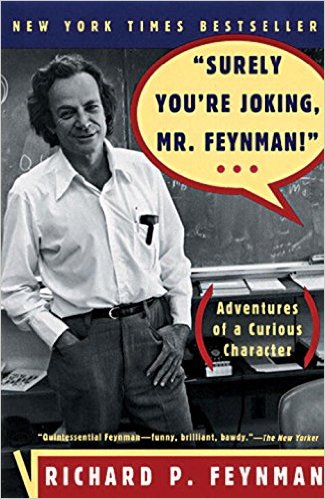I absolutely loved this book.
I had a smile on my face the whole time I was reading it.
My Feynman was so full of mischief and curiosity about the world.
He saw the world as a series of puzzles and he felt driven to solving them.
When he became curious about something or wanted to learn about something, or how to do something, he dove straight in and became an expert via experimentation.
This book was recommended several times inside a collection of interview transcripts with many of the worlds greatest minds. It just kept popping up again and again.
It’s not normally a book I would choose. It’s a collection of reminiscences by the Nobel Prize-winning physicist Richard Feynman who was born in 1918 and died in 1988.
I found this list of about 200 Feynman stories in the book useful for finding my 11 favourites.
My 11 favourite Feynman stories
From “Surely You’re Joking Mr Feynman: Adventures of a Curious Character” by Richard P. Feynman:
- Science Lab: He built a science lab at home (11 years old) to work out how electricity and radios worked
- Safe-Cracking: He enjoyed safe-cracking. He loved to open the locked filing cabinets full of nuclear bomb secrets
- Japan: In preparation for a trip to Japan he was advised to learn some Japanese by the tour leader, which he did, but the tour leader didn’t even bother. He refused to stay in a Western Hotel because he wanted an authentic Japanese experience
- Samba: He learnt how to play samba drums and became good enough to perform in a street parade
- Drawing: He learned how to draw portraits by taking classes and even sold a few pieces
- Brazilian University: He was a guest lecturer in Brazil and discovered that everyone was learning physics by rote instead of truly understanding. If they wanted to develop leading physics scientists, this was not the right path, and he told the university such during his final speed. He was taken seriously. He doubted his own conclusion because he did find 2 gifted students, but during his speech, both of these students revealed that they were from other countries
- Text Books: He was asked to review dozens of text books for high schools and read them all in detail (unlike any of the others on the review panel) and supported his approvals/disapproval’s with his detailed notes
- Ants: He spent hours and hours studying how ants leave trails and experimenting with how to move them around on bridges of paper without them noticing
- Understanding: He became quite famous for explaining complex theories (and anything really) because of how deeply he understood them himself, and his method of coming up with examples in his head of how things worked
- Smell: Discovered that human smell can be almost as good as a bloodhound’s by sniffing books and bottles that were recently handled
- Atomic Bomb: Played a role in building the first atomic bomb
And here are just 4 passages I highlighted:
Page: 120
“The trouble with playing a trick on a highly intelligent man like Mr. Teller is that the time it takes him to figure out from the moment that he sees there is something wrong till he understands exactly what happened is too damn small to give you any pleasure!”
Page: 295
“This question of trying to figure out whether a book is good or bad by looking at it carefully or by taking the reports of a lot of people who looked at it carelessly is like this famous old problem: Nobody was permitted to see the Emperor of China, and the question was, What is the length of the Emperor of China’s nose? To find out, you go all over the country asking people what they think the length of the Emperor of China’s nose is, and you average it. And that would be very “accurate” because you averaged so many people. But it’s no way to find anything out; when you have a very wide range of people who contribute without looking carefully at it, you don’t improve your knowledge of the situation by averaging.”
Page: 298
I couldn’t claim that I was smarter than sixty-five other guys—but the average of sixty-five other guys, certainly!
Page: 310
“Oh. Well, nobody knows anything about that, so I guess we can’t talk about it.” “On the contrary,” I answered. “It’s because somebody knows something about it that we can’t talk about physics. It’s the things that nobody knows anything about that we can discuss. We can talk about the weather; we can talk about social problems; we can talk about psychology; we can talk about international finance—gold transfers we can’t talk about, because those are understood—so it’s the subject that nobody knows anything about that we can all talk about!”
If you have an interest in science at all, or you are curious by nature, I think you’ll enjoy this book.
Find it on Amazon: “Surely You’re Joking Mr Feynman: Adventures of a Curious Character”

